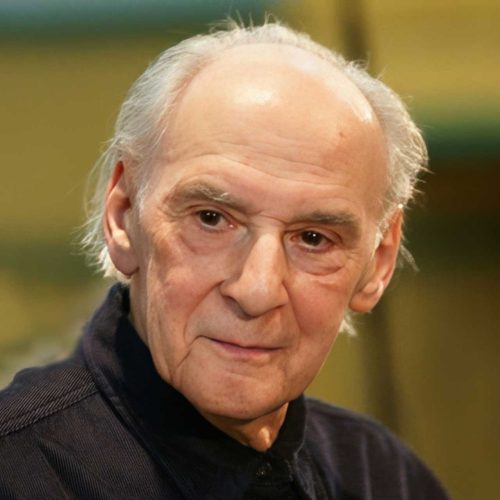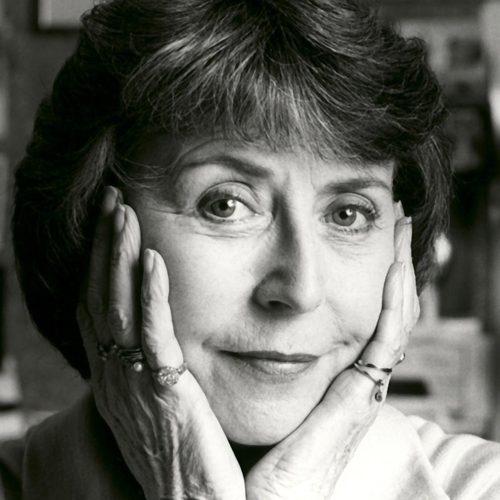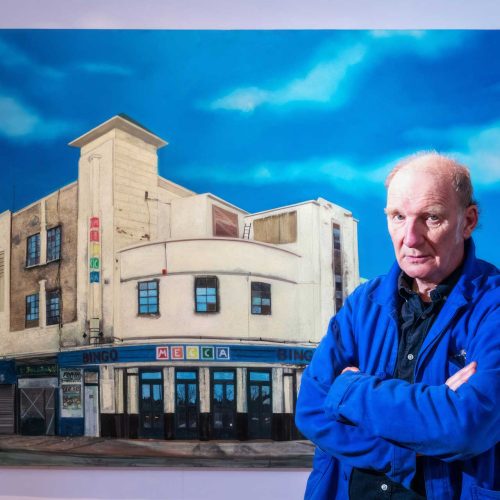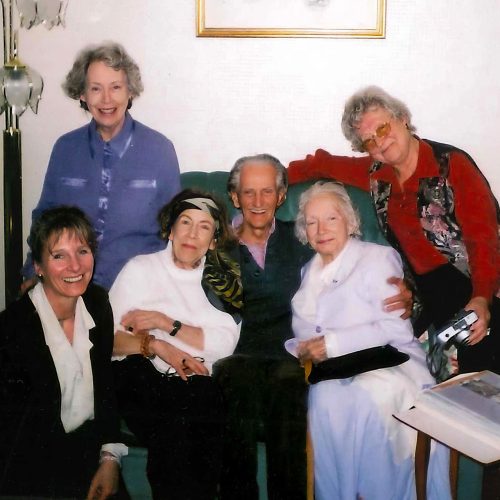Joseph Horowitz
Joseph Horovitz explains that his early enthusiasm was for the visual arts, and that it was only from about the age of 19 that he turned seriously to music. After a degree at Oxford University, he attended the Royal College of Music and then went to Paris for revelatory study with the legendary Nadia Boulanger. While there he went to Boris Kochno’s ballet class, saw Yvette Chauviré dance (which greatly inspired him), and was given sage advice on writing for the ballet by Roland Petit. After that, in 1951 he conducted for Colonel de Basil’s Ballet Russe, at the end of their existence. Colin Davis, a contemporary as a student, was co-conductor, and the ballet master was Serge Grigoriev, whose musical understanding turned out to be somewhat idiosyncratic.
In this interview, introduced by Stephen Johnson, Joseph Horovitz talks to Patricia Linton.
First published: September 16, 2025
Biography
Joseph Horowitz, the British composer and conductor, was born to a Jewish family in Vienna in 1926. His father was the co-founder of Phaidon Press, which he founded in 1923. In 1938, the family emigrated from Austria, to escape the Nazi threat, and to seek a safer life in England.
Horovitz read music and modern languages at New College, in Oxford, while simultaneously giving piano recitals for army camps during the war. This progressed to studying composition at the Royal College of Music in London under Gordon Jacob, where he won the Farrar prize. He then went to Paris to continue his studies under Nadia Boulanger.
In 1950, Horovitz became the music director of the Bristol Old Vic. During the Festival of Britain in 1951 he conducted ballet and concerts at the Festival Amphitheatre in London. He then conducted for Colonel de Basil’s Ballet Russe. During the 1950s, a number of his compositions were broadcast on the BBC, and in 1961 he became Professor of Composition at the Royal College of Music where he was later awarded an Honorary Doctor of Music.
He is the composer of 16 ballets scores, two one-act operas, five string quartets, nine concertos, and many works for wind and brass, as well as music for television. He made his Royal Ballet debut in 1990, revising Adolphe Adam’s score for Peter Wright’s production of Giselle. Other ballets include Alice in Wonderland, composed for Festival Ballet in 1953. As well as the Commonwealth Medal in 1959, Joseph Horowitz has won many awards for his music, both in this country and abroad. He died in 2022.
Transcript
in conversation with Patricia Linton
Joseph Horovitz: My passion was painting and drawing, and I was quite good at it. It was only when I was about 19, that I looked at my paintings and I was aware that I was a good artefact maker, but I wasn’t an artist. And I realised this: It’s great fun but this is not serious, whereas music began to attract me from a completely different angle. When I hear music, I feel movement; when I write music, I write for movement, and, I didn’t know it at the time, we were, we were talking about ballet, quite frankly I thought ballet was silly.
Patricia Linton: Had you been involved with dance at all at this point?
Joseph Horowitz: No, no.
Patricia Linton: So, the sense of movement came purely through your art?
Joseph Horowitz: It came from pictures and painting, and I think it began there. I mean this, I’m sort of analysing how I actually got into ballet at all. I don’t think I was ever taken to a ballet until, much, much later. And it was then I did quite well. I got my degree in Oxford, it was conducting and playing piano and so on, no idea of composing. So, I was a music maker, I wasn’t a music writer to begin with.
Patricia Linton: And this, I know from, was it from Oxford you went to study for a year with Nadia Boulanger
Joseph Horowitz: No, from Oxford the next step was one year at the Royal College of Music. To study orchestration with Gordon Jacob. And it was then, I had a year with Boulanger as well, but not a complete year. By that time, I was beginning to compose but not in a serious manner. It was, I could write music, but I didn’t consider myself a composer.
To begin with she was completely selfless. In other words, she sank herself into the mind and personality of the pupil. She found out somehow instinctively what the pupil wanted to write or wanted to express, and then she approached the piece of music in front of her, with that in mind, and saying ‘You have not expressed in that particular passage, what you seem, what I think you want to say.’ And it was in Paris while I was studying with Boulanger, by the way, that I woke, woke up to ballet.
Patricia Linton: I believe you did something with Boris Kochno?
Joseph Horowitz: Yes, but at the time I still thought it was silly. A friend of mine, an American who was also there, an ex-GI, he was in Paris. He rang me up early one morning: ‘I’ve got a job for you. You’ll earn a few Francs! Kochno’s dancing class the pianist has dropped out. Go along and play!’
Anyway, I rolled up there, and this was a ballet class, followed by rehearsals – this was 1949. He was a real bruiser. He was very muscular, he was like a navvy, and very frightening, and I saw him in the corner – it was a vast rehearsal room, I think it might have been somewhere at the top of the Châtelet Theatre. There was Kochno screaming at, it was practically only men there must have been 16 men, very tough looking guys, sort of Russian type of dancers with bulging muscles. Kochno sort of looked at me from afar and [CLEARS THROAT] said ‘Hallo! Hey!’
[Patricia Linton CHUCKLES]
Joseph Horowitz: And I looked round, and I had not the slightest idea of what was going on, what I should do. Very frightening. And one of the dancers sidled up, ‘I think he’s about to do an adagio, play something in 4/4 slow.’ And of course there was no music! So, I improvised; I was rather good improviser.
There was an Englishman, very interesting man, who was the English correspondent of Cette Semaine à Paris – This week in Paris – which was like the ‘what’s on’, and he was the ballet critic. Actually, he was a poet, and he was a rather fine poet called Nathaniel Tarn – T-A-R-N that was his pseudonym. His real name was Michael Mendelsohn – wonderful person. He became a friend of mine. He said, ‘I want to give you a wonderful treat. Tonight, [Yvette] Chauviré is dancing, and you’re going to come with me’.
I said, ‘Ah, come on Michael, I’m not going to sit there with a twirling around there with a little skirt on’ and so on, but what, he said ‘You don’t know, you do not understand’, and I said, ‘No, I don’t understand’. He took me there and I watched, and he said, you know, this is, uh, she [Chauviré] was about 30-something by then. He said, did you see what she’s now done, she’s done 32 of what you call twirls, which were the fouettés. And I said, ‘Well it’s very athletic!’ He said if you try to do one of those 32, you’d be flat on your face. And I said ‘Hum’. I was rather impressed by that. That was the start of it.
Patricia Linton: When you saw her, were you not caught by her musicality? I mean she was exquisitely musical.
Joseph Horowitz: Well, not at the time, you see. What I was caught by [was] the rhythmic exactness. I was more interested in the fact that she kept time with the music. Now, of course, what actually happened was the conductor was keeping time with her, but that’s, well, the first time, I began to realise that I didn’t know what the music was – a sort of rum-tee-tum of some kind. But I could see that was absolutely in time with the music and that excited me. Because for a conductor, or a budding conductor, if the instruments are playing to the same tempo that I am beating time, then our two heart beats are connected and I saw that in her, the fact that it was beautiful or had an elegance was the second thing that I eventually found out, but not immediately.
By the way, at the time I had already written the score of a ballet, stupidly without ever consulting a choreographer. I’d written a half-hour ballet called The Emperor’s New Clothes. I did that while I was at Royal College with Gordon Jacob.
And get this for cheek! I had an introduction while I was in Paris to Roland Petit. And something, I brought this score. And he leafed through [it], but I think he only read the headings of the numbers, because the ballet master like Petit, or a dancer, wasn’t really a musician. Now I didn’t know this, and I thought Petit would examine my score. Course not! But he looked at it very, very charmingly, in respect I was young, and he sort of folded the score up, it was quite large.
He said this is very interesting what you are telling me, but you must – this is a lesson I had – you must realise, a composer shouldn’t write a ballet, a choreographer writes a ballet. The composer writes for the choreographer because I may not be interested in the subject that you have written. I have my own ideas, I know what I want, and I would like to have music written for my idea. You have an idea here, but I don’t feel like entering your idea, just now. I’m very busy, I’m doing another ballet. He said, ‘Much better that you come to rehearsals and you meet choreographers, and you make friends, and so on, and when they need music, they will ask you to write music.’ That stuck with me. I have never written anything for ballet unless I’ve been commissioned by a choreographer – and that doesn’t mean money, necessarily, but it means that somebody wants to have my music, my collaboration, because the ballet is theirs, it’s not mine.
Paris had a big influence on me, but the real ballet practitioner came in England mainly, the Festival of Britain, when I was doing this open-air ballet, Orlando, the Marmalade Cat, as a conductor.
Patricia Linton: Where, I know you conducted for the last, the very end of the Ballets Russes?
Joseph Horowitz: Yes, that was immediately…
Patricia Linton: Was it around that time?
Joseph Horowitz: Yes, it was immediately after. After the Festival of Britain, which ended in Autumn 1951, at the very end of ’51. I was the co-conductor of the Colonel de Basil’s Ballets Russes, which began in the autumn of ’51 and went into the beginning of 1952, a touring company. And the other conductor was Colin Davis, who was my fellow student at the Royal College. He couldn’t play the piano, that’s why I did all the rehearsals. Well, there were other ballet pianists there, but Colin sat around, and he didn’t like this job at all. He was against the… he self-confessed that he hardly ever watched. He knew he had to watch the dancers, but I mean he was very angry when the tempi were not what he wanted, and so on. And Colin was doing half the repertoire, and I was doing the other half. And Colonel de Basil died about a couple of weeks before the company arrived, and George Kirsta, the artist, the designer, took over the direction of this Ballet Russe.
Patricia Linton: And the balletmaster at that time was Serge…
Joseph Horowitz: Grigoriev…
Patricia Linton: Do you remember him?
Joseph Horowitz: Very well, yeah. I could draw his face for you!
Patricia Linton: Because, I mean, the interesting thing about that is he came from such a different age. He trained at the Mariinsky, and going into the Mariinsky company and joined Diaghilev in about 1909…
Joseph Horowitz: I tell you what, he was wonderful, a rather giant of a man…
Patricia Linton: Very tall
Joseph Horowitz:…at the same time, I mean, the extraordinary lack of knowledge that that man had about actually what the ballet conductor is really doing. Colin Davis was in the pit, and there was a piano rehearsal going on, and there’s this tune we were doing – a ballet called Les Présages, which…
Patricia Linton: Massine?
Joseph Horowitz: Yep, Les Présages – needs a big orchestra, which we didn’t have, but we got near it and there’s this thing that goes, [SINGS TUNE], and Grigoriev shouted down to the pianist, he says ‘I want the piece which goes…’ [SINGS TUNE], and he pointed as though that were the first beat, and Colin Davies says, all right, to the pianist now let’s go. ‘No! Not ump-daa!’ He said, ‘I want you to go baa! ba-da’. So there, it meant that he, Grigoriev did not know that that is a syncopation where the girls should step forward after the conductor had given the beat, like [CLAPS] [SINGS DA DA DA] but Grigoriev thought the tune goes [CLAPS] [SINGS], which would have been highly dangerous because the orchestra doesn’t work that way.
Patricia Linton: Do you think this is what irritated Colin Davis so much?
Joseph Horowitz: Well, Colin, by that time he was just laughing. He couldn’t take it anymore.
The transcript of this podcast may have been lightly edited for ease of reading.




